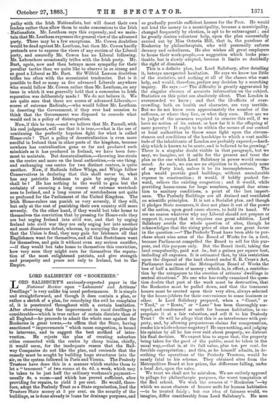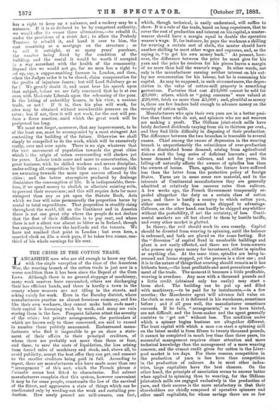LORD SALISBURY ON "ROOKERIES." TI ORD SALISBURY'S anxiously-expected paper in the
National Review upon "Labourers' and Artisans' Dwellings" is very unlike Ma usual performances. It is simple and straightforward, and though it does contain a plan, or rather a sketch of a plan, for remedying the evil he complains of, it is penetrated throughout with a certain hesitation. ' After observing that the improvement in rural dwellings is considerable—which is true rather of certain districts than of all England—he proceeds to admit the whole case against the Rookeries in great towns,—to affirm that the State, having sanctioned "improvements " which cause congestion, is bound to intervene, and to suggest the best method of inter- vention. He rejects the plan of creating suburban cities connected with the centre by cheap trains, chiefly, it would seem, for the inadequate reason that the Rail- way Companies do not like the plan, and contends that the remedy must be sought by building huge structures into the air' on the system followed in Paris and Vienna. The Peabody Trustees have done this in a manner which enables them to let a " tenement " of two rooms at 4s. 4d. a week, which may be taken to be just half the ordinary workmen's payment— usually 48. a room—and which has proved sufficient, after providing for repairs, to yield 3 per cent. He would, there- fore, adopt the Peabody Trust as a State organisation, lend the Trustees State money at 3 per cent, on the security of the buildings, as is done already in loans for drainage purposes, and so gradually provide sufficient houses for the Poor. He would not lend the money to a municipality, because a municipality, changed frequently by election, is apt to be extravagant ; and he greatly desires volunteer help, upon the plan successfully carried out by Miss Octavia Hill, that is, the purchase of Rookeries by philanthropists, who will personally enforce decency and orderliness. He also wishes all great employers to house their work-people,—a suggestion which looks prac- ticable, but is slowly adopted, because it limits so decidedly the right of dismissal. This is a definite plan, but Lord Salisbury, after detailing it, betrays unexpected hesitation. He says we know too little of the statistics, and nothing at all of the classes who want help, and would, therefore, preface any decision by a searching inquiry. He says :—" The difficulty is greatly aggravated by the singular absence of accurate information-on the subject. Statistics on this point are absolutely silent. That London is overcrowded we know ; and that the ill-effects of over- crowding, both on health and character, are very terrible. But we do not know even approximately the number of the sufferers, or where they live, or what they earn. How are we to judge of the measures required to remove this evil, if we have no notion of its extent. or how far it is the offspring of mere poverty? It ought to be within the means of our central or local authorities to throw some light upon the circum- stances and conditions of the hardships to which a vast multi- tude of the inhabitants of London are probably exposed,—hard- ship which is known to be acute, and is believed to be growing.' There is a singular doubt visible in that paragraph, but we may, we imagine, set it aside for the present and treat the • plan as the one which Lord Salisbury in power would recom- mend. As such, we can see no objection to it, certainly none of any Party kind, unless it be its incompleteness. The plan would provide good buildings, without unendurable expense in construction ; it would, if boldly pushed for- ward, relieve the existing congestion ; and it would, while providing house-room for large numbers, compel due atten- tion to sanitary conditions, a point of the last import- ance. The Peabody Buildings are all drained and ventilated on scientific principles. It is not a Socialist plan, and though it pledges State resources, it does not place it out of the power of the nation, upon good cause shown, to hold its hand. We see no reason whatever why any Liberal should not propose or • support it, except that it requires one great addition. Lord Salisbury avoids the whole question of sites, though he acknowledges that the rising price of sites is one great factor in the question :—" The Peabody Trust have been able to pur- chase about nine acres of the Board of Works for 5s. a foot, because Parliament compelled the Board to sell for this pur- pose, and this purpose only. But the Board itself, taking the land compulsorily, paid not 5s., but a guinea per square foot, including all expenses. It is estimated that, by this restriction .upon the disposal of the land cleared under S. R. Cross's Act, 'Parliament has caused the Metropolitan Board of Works the loss of half a million of money ; which is, in effect, a contribu- tion by the ratepayers to the erection of artisans' dwellings in central situations." No one who has really examined the ques- tion doubts that part of the work must be destructive, that the Rookeries must be pulled down, and that the tenement houses must be erected upon their very sites, always selected by the house-jobbers for their convenience to some business or other. Is Lord Salisbury prepared, when a "Court," or " Yard," or "Rents," or " Lane " has been thoroughly sur- veyed, and condemned as unfit for human habitation, to ex- propriate it at a fair valuation, and sell it to his Peabody Trust ? Or will he allege that this is an interference with pro- perty, and, by allowing preposterous claims for compensation, render his whole scheme nugatory? He says nothing, and judging his opinion by all he has ever said about property, we distrust his final decision. We expect him to argue that, the property being taken for the good of the public, must be taken in the usual way,—that is, at its full value, plus ton per cent. for forcible expropriation ; and this, as he himself admits, in de- scribing the operations of the Peabody Trustees, would be nearly fatal to his scheme. They obtained sites from the Metropolitan Board at low prices, the difference falling, under a local Act, upon the rates.
We trust we shall not be mistaken. We are entirely opposed to pillage for philanthropic purposes, the worst temptation of the Red school. We wish the owners of "Rookeries "—by which we mean clusters of houses unfit for human habitation —to be treated fairly ; but our idea of fairness would, we imagine, differ considerably from Lord Salisbury's. No man has a right to keep up a nuisance, and a rookery may be a nuisance. If it is so declared to be by competent authority, we would offer its owner three alternatives,—to rebuild it, under the provisions of a strict Act ; to allow the Peabody Trustees to rebuild it, and hand it over to him, the cost remaining as a mortgage on the structure ; or to sell it outright, at so many years' purchase, the number being fixed by tte condition of the building, and the rental it would be worth if occupied ia a way accordant with the health of the community. Beyond this we would not go, for no man has a right to set up, say, a copper-smelting furnace in London, and then, when the Judges order it to be closed, claim compensation for the profits of injurious fumes ; but will Lord Salisbury go so far ? We greatly doubt it, and must hear his speech upon that subject, before we are fully convinced that he is at one even with Moderate Liberals upon the rehousing of the poor. Is the letting of unhealthy houses, in his view, a noxious
trade, or not ? If it is, then his plan will work, for sites may be obtained without unendurable pressure on the rates ; but if not, then it will not work, for the cost will pro- duce a fierce reaction, amid which the great work will be postponed too long. We must not forget, moreover, that any improvement, to be of the least use, must be accompanied by a most stringent Act controlling the building of the future. Otherwise we shall simply be compelled to do the work, which will be excessively costly, over and over again. There is no sign whatever that the vast movement of population towards the great cities which is the origin of urban overcrowding will slacken yet for years. Labour tends more and more to concentration, the great business, with its skilled workers and severe discipline, under-selling all competition by little men ; the country folk are swarming towards the more open careers offered by the cities ; and the better atmosphere produced by drainage diminishes the consumption of life. It is indispensable, there- fore, if we spend money to abolish or alleviate existing evils, to prevent their recurrence; and this will require Acts far more stringent than any as yet upon the Statute Book, Acts which we fear will raise permanently the proportion borne by rental to total expenditure. That proportion is steadily rising throughout the world, till on the Continent and in America there is not one great city where the people do not declare that the first of their difficulties is to pay rent, and where there is not a silent war almost as bitter as in Ireland, though less sanguinary, between the landlords and the tenants. We have not reached that point in London ; but even here, a married clerk on 25s. a week pays, if he takes two rooms, one- third of his whole earnings for his rent.



































 Previous page
Previous page